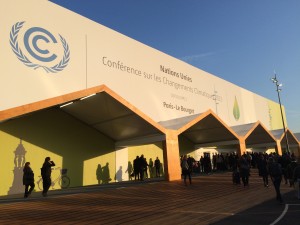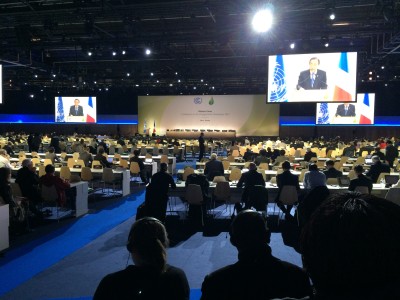 UC Berkeley’s news outlet published a Q&A with me on the important role that California is playing in the Paris negotiations. Here’s an excerpt:
UC Berkeley’s news outlet published a Q&A with me on the important role that California is playing in the Paris negotiations. Here’s an excerpt:
Could you elaborate on California’s leadership around climate change?
In 2006 California passed the first-in-the-nation law to limit our greenhouse gas emissions. Since then we’ve embarked on a suite of measures — investments, policies and programs — to bring down our carbon emissions. So far it’s been an interesting success story, and a great example for the international community, demonstrating that you can decarbonize and still increase economic growth.
We’re on pace to dramatically bolster our renewable energy supply. We have a very aggressive goal to get to 50 percent renewables by 2030, and we’re learning how to site these facilities better and to integrate the variable energy generated by solar and wind facilities. In terms of petroleum usage, California has 40 percent of the electric vehicle sales in the country, as well as strong sales of hybrid cars. We have some good state programs to encourage electric vehicle ownership.
On storage of surplus solar and wind energy, we have the only mandates in the country for utilities to buy a certain amount of energy storage. We’re seeing a huge growth in standalone batteries and other technologies, and we’re trying to build high-speed rail and to electrify more of our transportation. On energy efficiency, we have goals to double the efficiency of our existing buildings by 2030.
Since my expertise is on California’s climate efforts and not the international legal process, I may be overly biased toward the importance of what California is doing. But at the same time, the more time I spend at the Paris COP, the more I realize that all the technological and economic changes that are making climate mitigation achievable for so many countries is due to the leadership and market power of California.
Not that California gets all the credit, but it certainly couldn’t have happened without the state either.
Back in 1920s Paris, an unknown writer named Ernest Hemingway hung out in the local cafes with other aspiring artists. It was an odd group, featuring communists like Pablo Picasso, fascists like Ezra Pound, and right-wingers like Gertrude Stein. But they helped each other, promoting their work and ultimately producing a generation of famous artists captured in Hemingway’s posthumous memoirs A Moveable Feast. I now wonder if the Paris climate talks may serve a similar purpose — galvanizing a diverse network of leaders that can cumulatively promote their cause back home.
I’ve been attending the UN climate summit this week in part to answer the question of why this process matters. As I blogged last week, it’s hard not to feel skepticism about a process that has essentially yielded very little for two decades now. At the same time, the independent work of states and nations like California and Germany have completely altered the economics and technology of climate mitigation for the better — making the UN process feel even more pointless by comparison.

Global elected officials and leaders gather in Paris to listen to the COP 21 plenary.
So in that spirit, I’ve been asking people at the conference why they believe the international process is important. Most of them admit to me that they’re not quite sure how effective it will be, given past failures and the work that remains ahead around the globe. And of course, we still don’t have a final deal, and we don’t know how well Obama Administration lawyers can craft an enforceable executive agreement that won’t need to be ratified by the U.S. Senate.
But the people I’ve spoken with have made a number of important points that shouldn’t be overlooked. Without Paris and all the great expectations associated with it, we wouldn’t have had a number of major developments, such as:
- The papal encyclical casting climate change as a moral issue by an influential religious leader. Or at least the encyclical probably wouldn’t have gotten the coverage it did with the timing that it had, plus the corresponding bump in public acceptance of climate science that it seems to have spurred.
- The California-led Under 2 MOU effort to rally subnational climate leaders, which was explicitly aimed at motivating international negotiators in Paris. At a minimum, each of those subnationals will benefit from the agreement in many untold ways, given the information-sharing and political alliance it has forged.
- The mountain of media coverage and attention on the climate issue that the Paris talks have generated, leading to greater public awareness and possibly support for climate mitigation efforts.
- The network of influential elected officials primed to return to their home jurisdictions and promote the needed climate policies, as I alluded to above. That national and subnational implementation is where all the real work will be. While we don’t yet know how successful these climate leaders will be, at least they’ll be returning from Paris about as well-prepared as possible to take on their domestic challenges.
All of these developments point to the importance of having a singular, global event and discussion on climate change, which Paris has so far produced.
But in attending the conference, I’ve also seen first-hand the value of having such a global networking event. From “climate justice” activists to clean technology purveyors to big business leaders to nonprofit advocates to elected officials from every corner of the globe, these summits offer idea-sharing and networking that carry benefits well beyond the gathering, leading to collaboration and ideas with as-yet-undefined but likely benefits.
Of course, there’s still the risk that Paris fails to produce an agreement — or a good one. Or that so much hope is placed in the process that even with a seemingly good agreement we take our attention off the all-important implementation phase at the national and subnational level.
But so far it seems like this conference has little downside. The leading national and subnational players will still need to get the work done on climate back home, but Paris will provide some wind at their backs. And it may deflate the objections of some opponents, who could previously cite the lack of international action as a reason to do nothing.
So even when the conference pavilions come down, my guess is this climate feast at Paris will continue to move.
Thursday I’m off to attend the UN climate change negotiations in Paris, primarily to highlight California’s effort to achieve a strong subnational agreement on greenhouse gas reductions. The “Under 2 MOU” is an impressive commitment by diverse subnational entities to keep warming to under two degrees Celsius by 2100. It already has 57 signatories, constituting the largest combined GDP in the world.
I’m looking forward to the trip, as I hope to learn a lot and meet people working on climate change all around the globe. But I have to confess, I’ve been a longtime skeptic of the UN process on climate change and am still unsure of what can be meaningfully gained there this time.
If we want to solve climate change, the world needs to do two things: put a meaningful price on carbon and reduce the cost of clean technologies, like solar panels and batteries. As I look to Paris, I wonder what authority the UN and the high-level attendees there have to actually make progress on those two fronts.
In terms of setting a price on carbon, it seems politically impossible that we’d ever have a UN-mandated carbon tax. That price will have to come from nations willing to impose it, and that means votes from members of parliaments and congresses across the globe (or party leaders, if we’re talking dictatorships here). Those decision-making bodies will be hardly represented in Paris, or bound by what comes out of it, as it seems most negotiators are agency heads and their deputies. In other words, President Obama and John Kerry do not have authority to impose a national carbon tax in the United States, they need congressional representatives to vote for it, and they won’t — at least in the current congress.
On the clean technology front, the UN may be better suited to develop a pot of money for rich nations to fund for clean tech. Already we’ve seen Bill Gates and other wealthy people step up for a “clean innovation” fund. So maybe we’ll see some progress there. But again, much of the support for clean technology will come from domestic programs, like the U.S. solar tax credit or California’s energy storage mandate. The people who make those decisions won’t be in attendance or negotiating and won’t have to abide by any resulting agreement.
So is Paris pointless? Well, sure, if we don’t get a good agreement. But if we do, what’s the upside? For starters, it can’t hurt to have a strong, international political signal that countries everywhere are willing to do something on climate. Maybe that statement will embolden decision-makers in these various countries to follow through on the needed policies, described above. And at a minimum, it could be useful to have information-sharing among the countries and a framework for more aggressive action in future years. So all of that is reason to support what’s happening in Paris.
I don’t mean to be a Debbie Downer, but I also don’t want the UN process to give everyone a false sense of progress, or distract from the real work that needs to be done. That work is happening now in places like California, Germany, Japan and other progressive states and nations. They need support and action to demonstrate to the world how to reduce emissions and grow the economy. Because ultimately those examples are what will motivate action in other places — not a voluntary international agreement.
I may return from Paris singing a different tune on the negotiations. But before I go, perhaps in the spirit of Pope Francis, I feel compelled to confess this pessimism.


